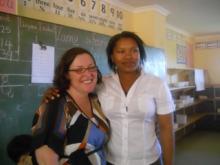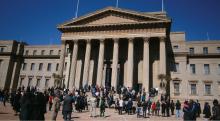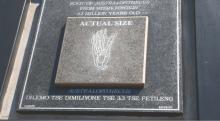From August 27 to September 20, 2013, Associate Professor Laada Bilaniuk will join linguistics Lecturer Clarissa Surek-Clark in leading an exploration seminar to Johannesburg, Durban, and Zululand in South Africa. This seminar aims to advance students’ knowledge of the politics of multilingualism, language contact and variation, and language and identity in South Africa. The country is home to eleven official languages, making it a perfect site for studying multilingual issues.
The program begins with six days in the environs of Johannesburg, the largest and most vibrant city in Southern Africa. Students will start by looking at the emergence of language in the context of human evolution, through a visit to the Cradle of Humanity Site. This complex includes the Sterkfontein Caves, location of many hominin fossils. They will then attend guest lectures and visit important sites to the social history of the region, including the Apartheid Museum, Museum of African Languages at UNISA in Pretoria, the Nelson Mandela House, and the Hector Pieterson Museum in Soweto, which documents the pivotal role of language in the transition from apartheid to democracy.
Next they will travel to the city of Durban, in the Province of KwaZulu-Natal, located on the Indian Ocean. Although the white and Indian populations in Durban, speak English as their native language, this city is also home to a large population of speakers of isiZulu, the most widely spoken indigenous language of South Africa. In order to better appreciate the linguistic ecology that exists in the city, during the first week in Durban students will attend isiZulu lessons taught by local teacher Mpumelelo Ntshangase. During the first weekend in KwaZulu-Natal, they will travel to the Zululand region, the heart of Zulu culture and identity. There they will experience a rural setting in which Zulu language and customs dominate. From there they will also visit the Hluhluwe/iMfolozi Game Reserve, to see African animals in their natural habitat.
Daily activities in Durban will include lectures on language and diversity and research methods. Students will participate in classes together with linguistics students from the University of KwaZulu-Natal, to share their experiences and learn the perspectives of local students. Exploration seminar students will also get hands-on experience gathering linguistic ethnographic data, through participant observation in local schools, markets, media organizations, and other public spaces. This will form the basis for their linguistic ethnographies. At the end of the program, students will spend a weekend as guests of local families in Durban.
1. University of Witwatersrand, Johannesburg, South Africa.
2. Bilingual sign in English and seSotho at the Cradle of Humankind World Heritage Site, which includes the Sterkfontein Caves where many hominin fossils have been found.
3. Clarissa Surek-Clark (right), co-director of the South Africa exploration seminar, with her former student Mpumelelo Ntshangase, now a teacher at an elementary school in Botha’s Hill near Durban. Ms. Ntshangase will teach the exploration seminar participants basic Zulu language


